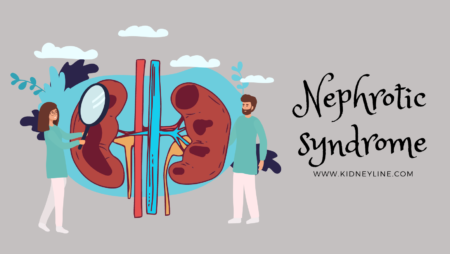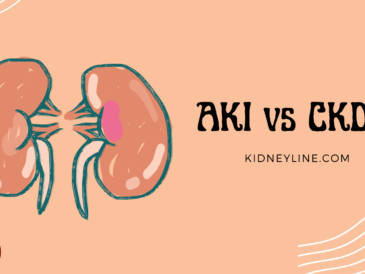For many people with nephrotic syndrome, the story begins this way: I woke up one morning, and my face was swollen. Or, I woke up one morning, and my feet were swollen. If this feels familiar and your doctor has said you have nephrotic syndrome, this article will provide some insight.
What is nephrotic syndrome?
Nephrotic syndrome is a condition in which large amounts of protein pour into the urine. This happens because of damage to the small blood vessels (glomeruli) that filter blood in the kidneys.
With loss of protein in the urine, the levels of protein in the blood falls. The liver responds to low blood proteins by producing large amounts of lipids leading to high cholesterol levels.
People with nephrotic syndrome also retain fluid in their body. This causes body swelling which is one of the early manifestation of the disease.
Causes of nephrotic syndrome
Nephrotic syndrome may be caused by primary kidney diseases or diseases outside the kidney.
Primary Causes
Primary causes of nephrotic syndrome are those that originate from within the kidneys. The most common primary cause of nephrotic syndrome is minimal change disease, which accounts for 80% of cases in children and 20% in adults. Other primary causes include:
- Focal segmental glomerulosclerosis (FSGS)
- Membranous nephropathy
- IgA nephropathy
It is important to note that there are secondary causes of some of these disorders. For example, HIV infection can cause FSGS. In such an instance, it is not a primary FSGS but a secondary one.
Secondary Causes
Secondary causes of nephrotic syndrome result from other medical disorders. Examples are:
Diabetes: High blood sugar levels damages the glomeruli.
Lupus: In this autoimmune condition, the immune system attacks the glomeruli and induces nephrotic syndrome.
Infections: Many infections have been linked to nephrotic syndrome. Examples are HIV, hepatitis B and Hepatitis C.
Cancers: Certain cancers like leukemia, lymphoma, colon, and breast cancers are associated with nephrotic syndrome.
If you have nephrotic syndrome it is important for your doctor to determine if you have primary nephrotic syndrome or secondary nephrotic syndrome. If you have secondary nephrotic syndrome, then the underlying cause must be treated.
Symptoms of Nephrotic Syndrome
Some of the most common symptoms of nephrotic syndrome include:
- Swelling: One of the most common symptoms of nephrotic syndrome is swelling. This swelling can occur in the feet, ankles, legs, face, hands, tummy and even the scrotum.
- Frothy urine: You may notice your urine appears frothy or foamy. Frothy urine is caused by the large amounts of protein in the urine.
- Breathlessness: If the fluid accumulates in your lungs, you may have difficulty breathing. One 71-year-old patient said it felt like he had no space for his breaths.
- Fatigue: Some people with nephrotic syndrome may experience fatigue or weakness.
- Loss of appetite: People with swollen tummy frequently complain of low appetite. They may feel bloated or feel full after eating a very small meal.
Some people feel well and can go about their daily activities with the only symptom being the leg swelling. But even if you feel well, it is important to get evaluated and treated.

Diagnosis of Nephrotic Syndrome
Nephrotic syndrome is diagnosed through a medical history, physical examination, and laboratory tests.
Urine Tests
Urine tests are the first step in diagnosing nephrotic syndrome. The most common urine test used is a urinalysis, which checks for protein in the urine. In nephrotic syndrome, the amount of protein in the urine is very high.
A 24-hour urine collection may also be ordered. Normal 24-hour urine protein is less than 150mg. In nephrotic syndrome, the urine protein exceeds 3g in 24 hours.
Because a 24-hour urine collection is challenging, your doctor may ask for a urine albumin creatinine ratio or a urine protein/creatinine ratio instead. These provide information about 24-hour urine protein.
Blood Test
A blood test to measure protein and albumin levels is usually ordered. Albumin is a protein found in the blood but lost in the urine in nephrotic syndrome. People with nephrotic syndrome have low protein and albumin levels.
Your doctor is also likely to order blood tests to determine the levels of cholesterol and triglycerides in your blood. Total cholesterol is often elevated in people with nephrotic syndrome.
Biopsy
A kidney biopsy may be recommended. It is used to determine the underlying cause of the condition.
A small piece of kidney tissue is removed and examined under a microscope during a kidney biopsy. Kidney biopsy can help identify the type of kidney disease causing the nephrotic syndrome.
Treatment of Nephrotic Syndrome
Medications
Medications used depends on the cause of nephrotic syndrome and the symptoms your have.
Your doctor may prescribe medications to reduce proteinuria, control blood pressure, and prevent blood clots.
If you have secondary nephrotic syndrome treating the underlying cause is crucial. The following medications may be prescribed for those with primary nephrotic syndrome:
- Corticosteroids: These drugs suppress the immune system and halt the ongoing inflammation in the kidneys. They are the most common first-line drugs given in primary nephrotic syndrome
- Immunosuppressants: These drugs also suppress the immune system. Examples are mycophenolate mofetil, tacrolimus, cyclosporine and cyclophosphamide. Doctors use immunosuppressants when corticosteroids are not effective or have side effects.
- Diuretics: These drugs help you get rid of excess fluids in the body by making you pee a lot.
- Anticoagulants: If you have very low blood albumin you may have a higher risk of forming blood clots. In such a situation, your doctor may recommend anticoagulants. These drugs prevent blood clots from forming.
- Statins: High cholesterol increases your chances of having heart related complications and stroke. Statins can lower your cholesterol levels.
- Blood pressure medications: These drugs help control blood pressure and reduce the risk of kidney damage. Not all patients with nephrotic syndrome have hypertension.
Dietary Changes
Dietary changes can help reduce proteinuria and control blood pressure. The following dietary changes may be recommended:
- Low salt diet: Salt can increase blood pressure and fluid retention. Limiting salt intake can help reduce these symptoms.
- Limiting protein intake: Eating too much protein can increase proteinuria.
- Reduced cholesterol and fat intake: Eating a diet low in cholesterol and fat can help reduce the risk of heart disease.
Others
Lifestyle changes can help reduce symptoms of nephrotic syndrome. Your healthcare team may recommend the following lifestyle changes:
- Exercise: Regular exercise can help reduce blood pressure and improve overall health.
- Weight loss: Losing weight can help reduce blood pressure and heart disease risk.
- Quitting smoking: Smoking can increase the risk of kidney damage and heart disease. Quitting smoking can help reduce these risks.
Can nephrotic syndrome be cured
Nephrotic syndrome can be treated. Following treatment, the symptoms and signs of nephrotic syndrome may disappear and never recur. Some others have repeated episodes. When there are no features of the disease the person is said to have gone into remission.
Some people have persistent symptoms despite treatment.
Complications of Nephrotic Syndrome
Nephrotic syndrome can lead to several complications, including:
Infections
People with nephrotic syndrome are at an increased risk of infections. This is because nephrotic syndrome causes the loss of important proteins, like antibodies, which are part of the body defense system. Infections that commonly affect people with nephrotic syndrome include urinary tract infections, skin infections, and pneumonia.
High Cholesterol
Nephrotic syndrome can cause high cholesterol levels because the liver produces more lipids in response to protein loss in the urine. High cholesterol levels can increase the risk of heart disease and stroke.
Blood Clots
Nephrotic syndrome can increase the risk of blood clots forming in the blood vessels. This risk is due to the loss of proteins that help to prevent blood clots. Blood clots can be life-threatening if they travel to the lungs or brain.
Malnutrition
People with nephrotic syndrome may experience malnutrition due to protein loss in the urine. Protein is essential for the growth and repair of the body’s tissues, and when it is lost, the body may not function properly.
Kidney Failure
In some cases, nephrotic syndrome can lead to kidney failure. This occurs because the protein excreted in the urine is toxic to the kidneys. If left untreated, protein in urine damages the kidneys so that they can no longer filter waste products from the blood effectively.
Is nephrotic syndrome life threatening?
Although nephrotic syndrome responds well to treatment in many cases, it is potentially dangerous. Complications that are life-threatening are
- Blood clots
- Kidney failure
- Severe infections
Bottom line
Nephrotic syndrome is not a single disorder. Instead, it is a clinical picture caused by several conditions. Therefore, prompt evaluation and treatment are needed because it is associated with potentially grave complications like blood clots and kidney failure.
Disclaimer
The information provided here is for educational purposes only. Discuss any medical issues and health concerns you have with your healthcare team.




